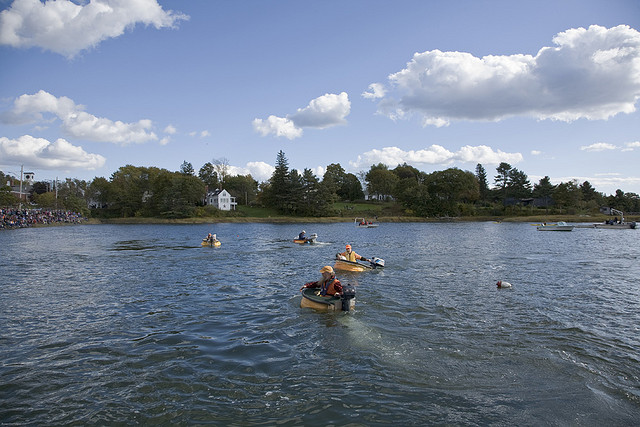By V. HANSMANN

There were hundreds of summer camps in Maine in the ’60s. It was a seasonal gulag for middle-class white kids, ages 8–16. Being shipped off to the woods by your parents for eight whole weeks felt like a secret Get Out Of Jail Free card. Only the nametags on your clothes connected you to who you were once you had been dropped into June, and then, somewhere around August, you would brown and swell and burst into flame like a marshmallow on a stick.
Two rows of cabins faced one another across a ragged slope called the Drumlin, the younger boys on one side and the older boys opposite, while, in between, a flagpole served as the axis around which the summer days spun. They saluted the flag twice a day, dedicating themselves to truth, justice, and the American way with fingers crossed behind their backs.
A sawdust trail led down through the trees to the lake. Boys in plaid swim trunks lined up two by two for the march to General Swim. Chaos bobbed and swam and dunked and dove until the whistle blew for buddy count, then order and quiet prevailed for a split-second until the whistle blew again. Water required a new set of muscles, a new kind of bravery, and a storybook imagination. Anything that could be propelled by arms and legs, oars, paddles, or sails had boys in it.
At every opportunity, they sang in a gusto of reedy voices, everything from call-and-response shouting matches in the dining hall to Sunday vespers that carried through evening windows and mingled with the whispers of the pines. They knew dozens of songs by heart—a round called “There’s a Hole in the Bottom of the Sea,” the Camp Song that was the Notre Dame fight song rewritten, a hymn based on the ballad from Sibelius’s Finlandia. It all sounded happy and it all sounded loud.
They learned things—tennis strokes, the shapes of oak leaves, and the pleasure of ice cream only three times a week. They did things—slept in wet sleeping bags, ate six hotdogs in a row, and helped a younger kid master The Deadman’s Float. They felt things, like compassion, competition, or disappointment. All this on their own. Their parents were a postage stamp away. And they made hundreds of lanyards and then came back the next summer to make more.
Camp life felt both electric and mild. The only time things slowed down was after Taps. Not even the weather made any difference. Have you ever had your hair cut outdoors? In a barber’s chair? Just as the lake’s surface lost the dip of the oar or the plunge of a dive, consequences did not disrupt the idyll of summertime. When it came time to say good-bye and go home, camp became a daydream where a boy could live for ten months until the next June.
V. Hansmann was raised in southern New Jersey and is a contributor to The Common’s Dispatches column.
Photo by Flickr Creative Commons user squash-buckler.




